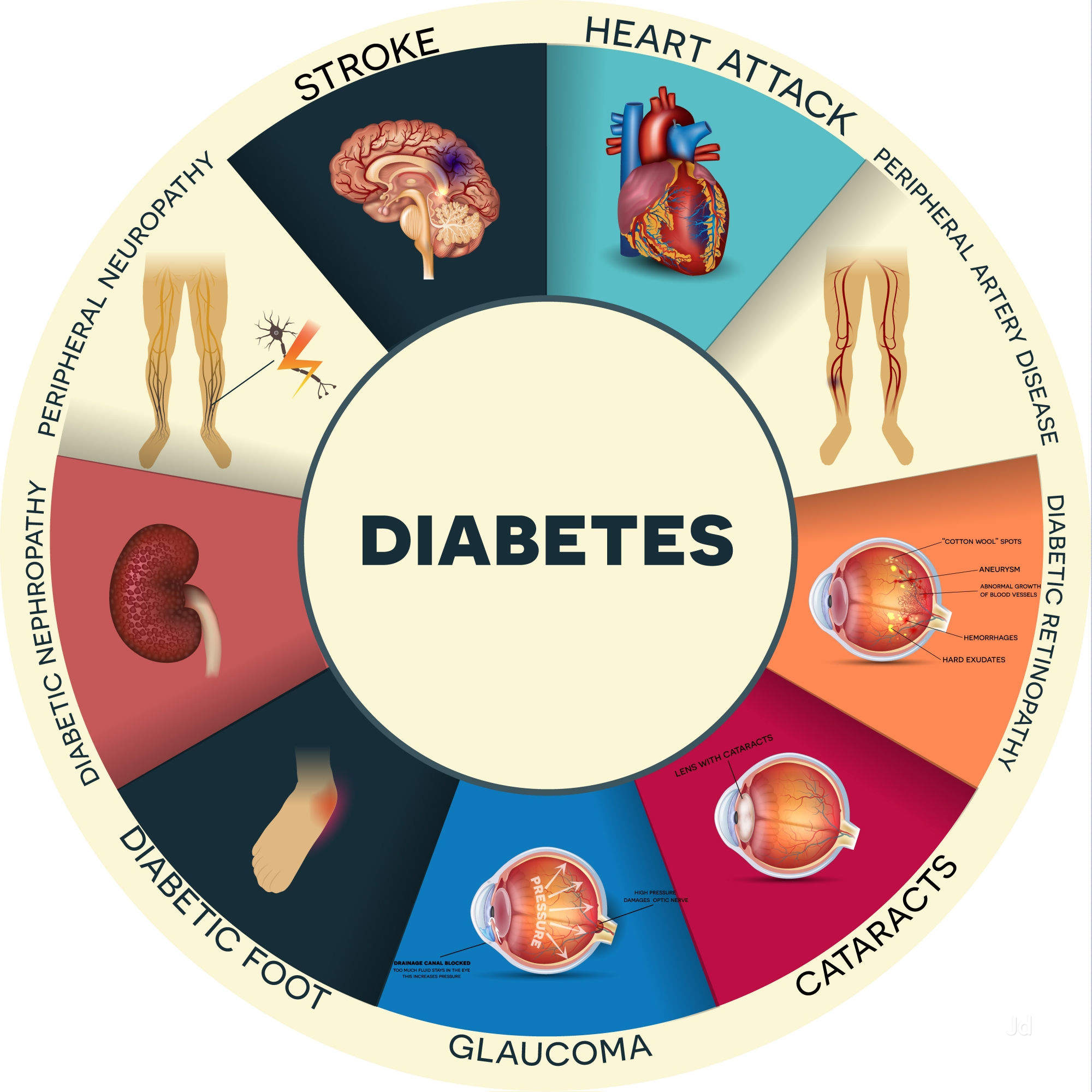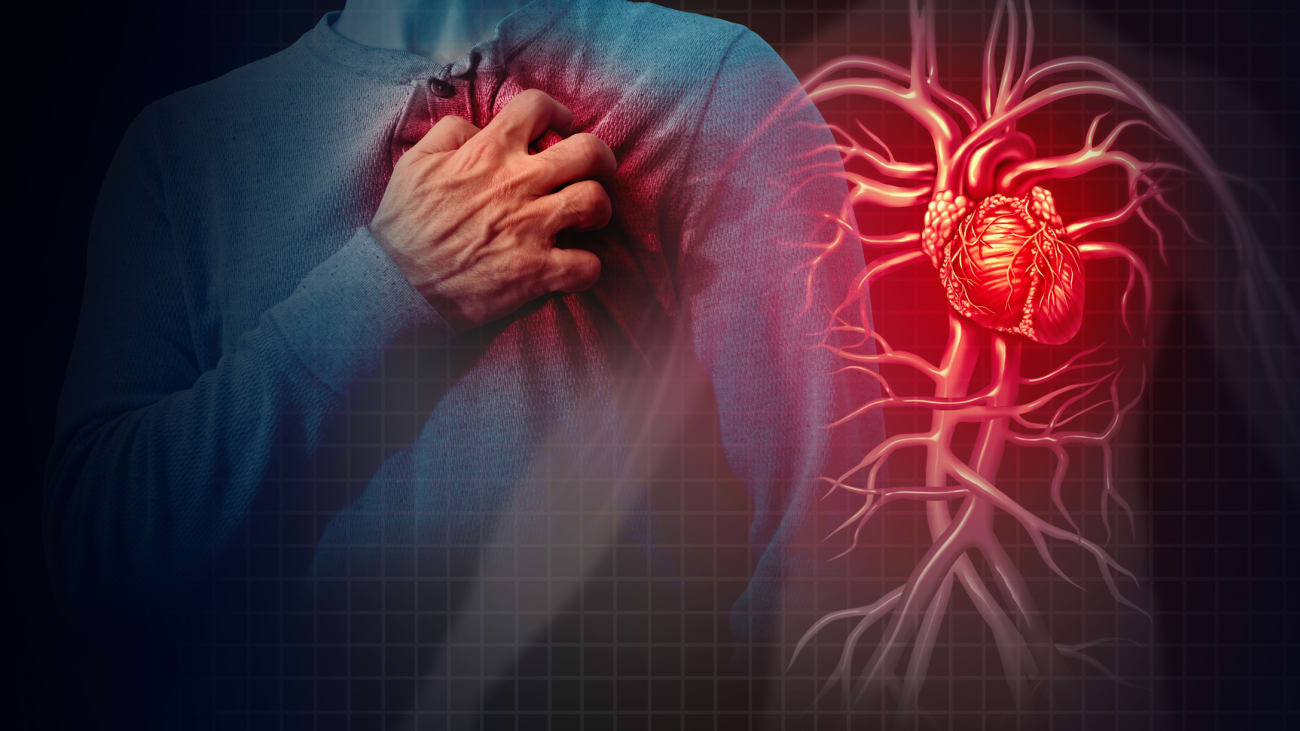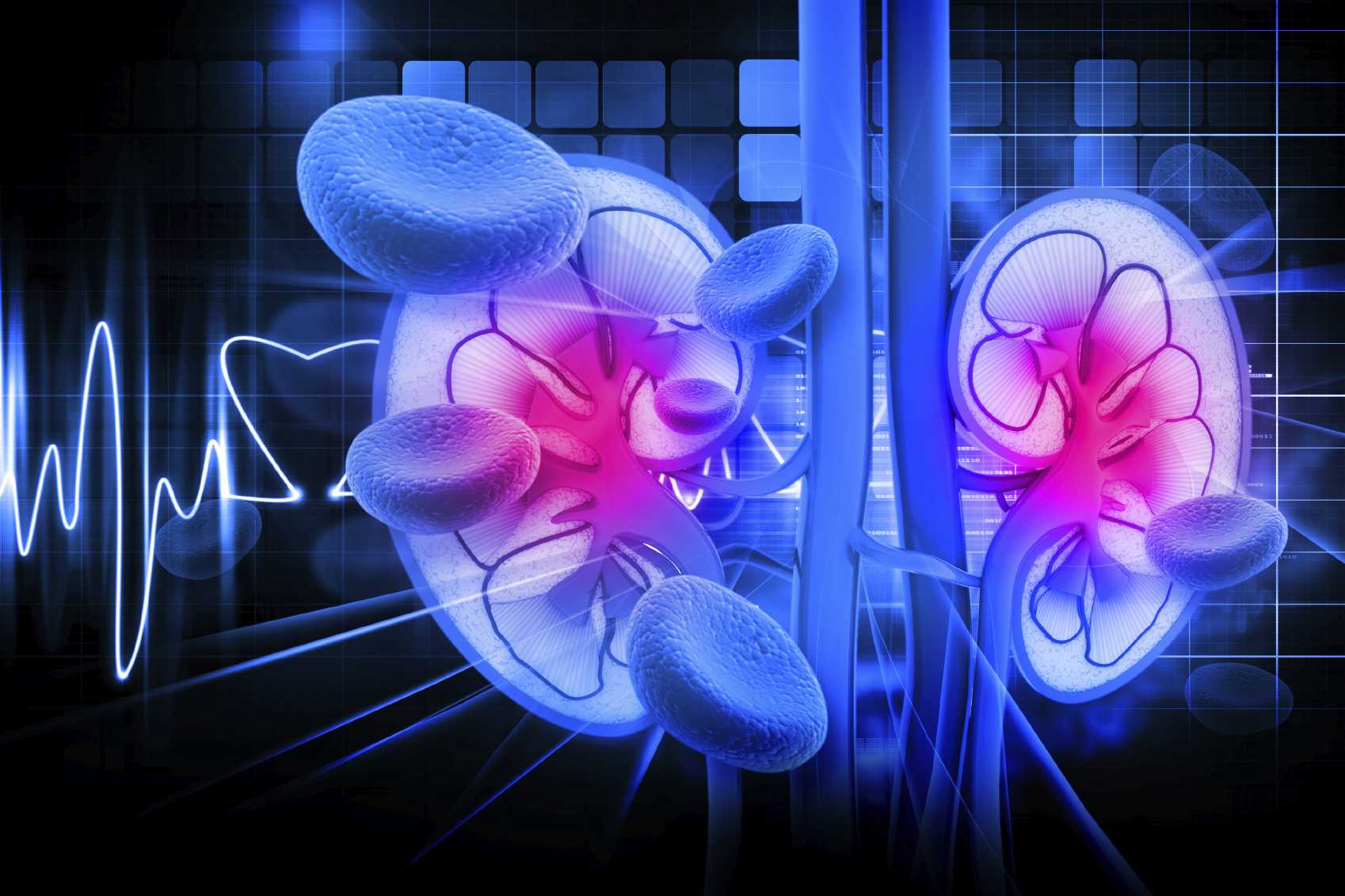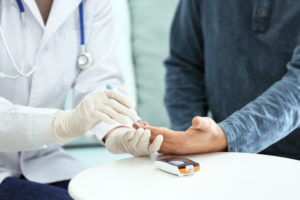
- Hypertension Is Also Known As High Blood Pressure.
- The Heart Pumps Blood Into The Body Through Arteries.
- A Normal Blood Pressure Is Required To Push Blood To Various Parts Of The Body Through Arteries.
- Normal Blood Pressure Values Are 120 MmHg In Systolic (When The Heart Contracts) And 80 MmHg In Diastolic (When The Heart Relaxes).
- In Hypertension, Blood Pressure Remains Too High For The Longest Time.
- Hypertension Usually Has No Symptoms.
- Smoke
- Don't Exercise Enough
- Eat Too Much Fat And Take More Salt In Food
- Drink Alcohol
- Are Overweight
- Having Diabetes
- Have Regular Check-Ups
- Take Your Medicines Every Day
- Restrict Salt Intake
- Include Fruits, Green Vegetables In Your Daily Intake
- Eat Less Fat
- Aim To Walk For At Least 30 Mins Each Day
- Try To Quit Smoking
- Try To Restrict Alcohol Consumption
- Heart – Leading To Heart Attacks
- Brain – Leading To Stroke
- Kidneys – Leading To Kidney Failure And Dialysis
- Eyes – Leading To Impaired Vision And Blindness
- Dyslipidemia Is A Condition In Which Abnormal Amount Of Lipids (E.G. Triglycerides, Cholesterol And/Or Fat Phospholipids) Found In The Blood.
- Lipid Is Basically Cholesterol, Which Is Waxy, Fat-Like Substance That Your Body Needs.
Cholesterol is of 2 types:
- Good Cholesterol (HDL)
- Bad Cholesterol (LDL, VLDL, IDL, TG Etc.), When You Have Too Much Bad Cholesterol In Your Blood, It Can Build Up On The Walls Of Your Arteries, This Can Lead To Heart Disease And Stroke, Leading Causes Of Death In Diabetes.
Poor diet: Eating saturated fat, found in animal products and trans fats, found in some commercially baked cookies can raise your cholesterol level.
Poor lifestyle like,
- Obesity
- Large Waist Circumference
- Lack Of Exercise
- Smoking
- Diabetes
- High Cholesterol Itself Does Not Have Symptoms.
- Many People Do Not Know That Their Cholesterol Level Is High.
- That’s Why It’s Important To Schedule Regular Visits With Your Doctor.
- Be Sure To Ask About Having Your Cholesterol Tested.
How is high cholesterol diagnosed?
- Doctors Can Do A Simple Blood Test To Check Your Cholesterol.
- Most Adults Should Get Their Cholesterol Levels Checked Every Five Years.
- If Your Total Cholesterol Is 200 Mg/Dl Or More, Or If Your HDL (Good Cholesterol) Is Less Than 40 Mg/Dl, You Will Need To Have A Lipoprotein Profile Blood Test Done.
- Ask Your Doctor About What May Be Right For You.
- Lowering High Cholesterol Levels Is Important For People At All Ages, With And Without Heart Disease.
- If You Have High Cholesterol, You Will Need To Eat A Healthy Diet, Exercise Regularly, Quit Smoking, And You May Need To Take Medication.
Eat A Healthy Diet
- A High Amount Of Saturated Fat And Cholesterol In Food That You Eat Can Increase Blood Cholesterol, So Avoid Such Consumptions.
Maintain A Healthy Weight
- Being Overweight Can Increase Your Cholesterol Level.
- Losing Weight Can Help Lower Your LDL (Bad) Cholesterol And Total Cholesterol Level, And Raise Your HDL (Good) Cholesterol Level.
Exercise Regularly
- Regular Physical Activity Can Help Lower LDL (Bad) Cholesterol And Raise HDL (Good) Cholesterol. You Should Try To Be Physically Active For 2 Hours And 30 Minutes (150 Minutes) Each Week.

- Foot Problems Are Common In People With Diabetes.
- Managing Your Blood Glucose Levels, Also Called Blood Sugar, Can Also Help Keep Your Feet Healthy.
- Over Time, Diabetes May Cause Nerve Damage, Also Called Diabetic Neuropathy. When You Lose Feeling In Your Feet, You May Not Feel A Pebble Inside Your Sock Or A Blister On Your Foot, Which Can Lead To Cuts And Sores. Cuts And Sores Can Become Infected.
- Diabetes Also Can Lower The Amount Of Blood Flow In Your Feet. Not Having Enough Blood Flowing To Your Legs And Feet Can Make It Hard For A Sore Or An Infection To Heal. Sometimes, A Bad Infection Never Heals. The Infection Might Lead To Gangrene.
- Gangrene And Foot Ulcers That Do Not Get Better With Treatment Can Lead To An Amputation Of Your Toe, Foot, Or Part Of Your Leg.
- Work With Your Health Care Team To Make A Diabetes Self-Care Plan, Which Is An Action Plan For How You Will Manage Your Diabetes.
- Your Plan Should Include Foot Care. A Foot Doctor, Also Called A Podiatrist, And Other Specialists May Be Part Of Your Health Care Team.
Prevention & Self Care
- Check Your Feet Every Day
- Wash Your Feet Every Day
- Smooth Corns And Calluses Gently
- Trim Your Toenails Straight Across
- Wear Shoes And Socks At All Times
- Protect Your Feet From Hot And Cold
- Keep The Blood Flowing To Your Feet
- Get A Foot Check At Every Health Care Visit
- Wash Your Feet With Soap In Warm, Not Hot, Water.
- Test The Water To Make Sure It Is Not Too Hot.
- You Can Use A Thermometer (90° To 95° F Is Safe) Or Your Elbow To Test The Warmth Of The Water.
- Do Not Soak Your Feet Because Your Skin Will Get Too Dry.
- After Washing And Drying Your Feet, Put Talcum Powder Or Cornstarch Between Your Toes.
- Skin Between The Toes Tends To Stay Moist.
- Powder Will Keep The Skin Dry To Help Prevent An Infection.
- Thick Patches Of Skin Called Corns Or Calluses Can Grow On The Feet. If You Have Corns Or Calluses, Talk With Your Foot Doctor About The Best Way To Care For These Foot Problems. If You Have Nerve Damage, These Patches Can Become Ulcers.
- If Your Doctor Tells You To, Use A Pumice Stone To Smooth Corns And Calluses After Bathing Or Showering. Pumice Stone Is A Type Of Rock Used To Smooth The Skin. Rub Gently, Only In One Direction, To Avoid Tearing The Skin.
Do NOT
- Cut Corns And Calluses
- Use Corn Plasters, Which Are Medicated Pads
- Use Liquid Corn And Callus Removers
- Cutting And Over-The Counter Corn Removal Products Can Damage Your Skin And Cause An Infection.
To keep your skin smooth and soft, rub a thin coat of lotion, cream, or petroleum jelly on the tops and bottoms of your feet. Do not put lotion or cream between your toes because moistness might cause an infection.
- Trim Your Toenails, When Needed, After You Wash And Dry Your Feet. Using Toenail Clippers, Trim Your Toenails Straight Across.
- If Your Doctor Tells You To, Use A Pumice Stone To Smooth Corns And Calluses After Bathing Or Showering. Pumice Stone Is A Type Of Rock Used To Smooth The Skin. Rub Gently, Only In One Direction, To Avoid Tearing The Skin.
- Do NOTcut Into The Corners Of Your Toenail. Gently Smooth Each Nail With An Emery Board Or Nonsharp Nail File. Trimming This Way Helps Prevent Cutting Your Skin And Keeps The Nails From Growing Into Your Skin.
- Have A Foot Doctor Trim Your Toenails If You Cannot See, Feel, Or Reach Your Feet Your Toenails Are Thick Or Yellowed Your Nails Curve And Grow Into The Skin.
- Wear Shoes And Socks At All Times. Do Not Walk Barefoot Or In Just Socks – Even When You Are Indoors. You Could Step On Something And Hurt Your Feet. You May Not Feel Any Pain And May Not Know That You Hurt Yourself.
- Check The Inside Of Your Shoes Before Putting Them On, To Make Sure The Lining Is Smooth And Free Of Pebbles Or Other Objects. Make Sure You Wear Socks, Stockings, Or Nylons With Your Shoes To Keep From Getting Blisters
If You Have Nerve Damage From Diabetes, You May Burn Your Feet And Not Know You Did. Take The Following Steps To Protect Your Feet From Heat:
- Wear Shoes At The Beach And On Hot Pavement.
- Put Sunscreen On The Tops Of Your Feet To Prevent Sunburn.
- Keep Your Feet Away From Heaters And Open Fires.
- Do Not Put A Hot Water Bottle Or Heating Pad On Your Feet.
- Wear Socks In Bed If Your Feet Get Cold. In The Winter, Wear Lined, Waterproof Boots To Keep Your Feet Warm And Dry.
Try the following tips to improve blood flow to your feet:
- Put Your Feet Up When You Are Sitting.
- Wiggle Your Toes For A Few Minutes Throughout The Day. Move Your Ankles Up And Down And In And Out To Help Blood Flow In Your Feet And Legs.
- Do Not Wear Tight Socks Or Elastic Stockings. Do Not Try To Hold Up Loose Socks With Rubber Bands.
- Be More Physically Active. Choose Activities That Are Easy On Your Feet, Such As Walking, Dancing, Yoga Or Stretching, Swimming, Or Bike Riding.
- Stop Smoking - Smoking Can Lower The Amount Of Blood Flow To Your Feet. If You Smoke, Ask For Help To Stop.
Ask your health care team to check your feet at each visit. Take off your shoes and socks when you’re in the exam room so they will remember to check your feet. At least once a year, get a thorough foot exam, including a check of the feeling and pulses in your feet.
- Get A Thorough Foot Exam At Each Health Care Visit If You Have Changes In The Shape Of Your Feet
- Loss Of Feeling In Your Feet
- Peripheral Artery Disease
- Had Foot Ulcers Or An Amputation In The Past
Call your health care provider right away if you have a cut, blister, or bruise on your foot that does not start to heal after a few daysskin on your foot that becomes red, warm, or painful—signs of a possible infectiona callus with dried blood inside of it, which often can be the first sign of a wound under the callusa foot infection that becomes black and smelly—signs you might have gangrene.
Tests
Diabetic Foot Screening for Peripheral Neuropathy Monofilament-
Test for touch-pressure sensation, Monofilament assess the four main areas of the plantar surface of the foot (Avoiding the areas of the callus).1st, 3rd, and 5th, metatarsal heads and the planter surface of the hallux (Big toe) are the preferred sites for the test.
Tuning fork-
Test for vibration loss, Vibrating fork is placed on hallux (Big toe) and doctor will ask you for feel vibration
Biothesiometer or Vibrameter-
Measure vibration perception threshold (VPT)
Tip-Therm or test tubes-
Test temperature sensation
Percussion hammer or Reflex hammer-
Test for ankle reflex

Having diabetes means that you are more likely to develop heart disease and have a greater chance of a heart attack or a stroke. People with diabetes are also more likely to have certain conditions, or risk factors, that increase the chances of having heart disease or stroke, such as high blood pressure or high cholesterol.
If you have diabetes, you can protect your heart and health by managing your blood glucose, also called blood sugar, as well as your blood pressure and cholesterol. If you smoke, get help to quit.
- Chest pain
- Rapid pulse rate
- Shortness of breath
- Sweating
- Fainting
- Vomiting
ELECTROCARDIOGRAM (ECG)
An ECG records the electrical activity of the heart. The heart produces tiny electrical impulses which spread through the heart muscle to make the heart contract.An ECG records the electrical activity of the heart. The heart produces tiny electrical impulses which spread through the heart muscle to make the heart contract.
These impulses can be detected by the ECG machine. You may have an ECG to help find the cause of symptoms such as the feeling of a 'thumping heart' (palpitations) or chest pain.
The ECG test is painless and harmless.
The electrodes on the different parts of the body detect electrical impulses coming from different directions within the heart. There are normal patterns for each electrode. Various heart disorders produce abnormal patterns. The heart disorders that can be detected include:
- Abnormal heart rhythms- If the heart rate is very fast, very slow, or irregular. There are various types of irregular heart rhythm with characteristic ECG patterns.
- A heart attack (Myocardial infarction) and if it was recent or some time ago. A heart attack causes damage to heart muscle and it heals with scar tissue. These can be detected by abnormal ECG pattern.
- An enlarged heart. Basically, this causes bigger impulses than normal.
- Small metal electrodes are stuck onto your arms, legs and chest. Wires from the electrodes are connected to the electrocardiogram (ECG) machine.
- The machine detects and amplifies the electrical impulses that occur at each heartbeat and records them onto a paper or computer.
- A few heartbeats are recorded from different sets of electrodes.
- The test takes about five minutes to do.
- You do not need to restrict what you eat or drink before this test, but it is recommended that you not smoke just before the test.
ECOCARDIOGRAPHY
- Echocardiography, also called an echo test or heart ultrasound, is a test that takes “moving pictures” of the heart with sound waves.
- You don’t have to stay in the hospital. It’s not surgery and doesn’t hurt.
Your doctor may use an echo test to look at your heart’s structure and check how well your heart is working.
This test may be needed if
- You have a heart murmur.
- You’ve had a heart attack.
- You have unexplained chest pains.
- You’ve had rheumatic fever.
- You have a congenital heart defect.
- The size and shape of your heart
- How well your heart is working overall
- If a wall or section of heart muscle is weak and not working correctly
- If you have problems with your heart’s valves
- If you have a blood clot
Echo tests are done by trained sonographers. You may have your test done in your doctor’s office, an emergency room, an operating room, a hospital clinic or a hospital room.
- You’ll lie on a bed on your left side or back.
- The sonographer will put special jelly on a probe and move it over your chest area.
- Ultra-high-frequency sound waves will pick up images of your heart and valves. No X-rays will be used.
- Your heart’s movements can be seen on a video screen.
- A videotape or a photograph can be made of the pictures.
- You can sometimes watch during the test.
- It usually takes one hour.
- It’s painless and has no side effects.
- An exercise stress test is used to determine how well your heart responds during times when it is working the hardest or at the time of exertion.
- During the test, you will be asked to exercise, typically on a treadmill while you are hooked up to an electrocardiogram (EKG) machine. This allows your doctor to monitor your heart rate.
- The exercise stress test is also referred to as an Exercise test or Treadmill test or Cardiac stress test.
- An exercise stress test is primarily used to help your doctor determine if your heart receives enough oxygen and proper blood flow when it needs it most, such as when you are exercising.
- It can be ordered for people who have been experiencing chest pains or other symptoms of coronary heart disease.
- A stress test specifically the ones that utilize exercise help to show extreme shortness in breathing, discomfort in the chest, dizziness and sudden weakening that indicate some underlying heart condition.
- It is also used to check the efficiency of the medications for heart diseases like angina and ischemia and also to recognize abnormal rhythm of the heart.
- A technologist will explain the test to you, take a brief medical history, and answer any questions you may have. Your blood pressure, heart rate, and electrocardiogram (ECG) will be monitored before, during, and after the test.
- You will be asked to sign a consent form. This form is required before the test can proceed.
- You will be asked to remove all upper body clothing, and to put on a gown with the opening to the front.
- Adhesive electrodes will be put onto your chest to capture an ECG. The sites where the electrodes are placed will be cleaned with alcohol and shaved if necessary.
- A mild abrasion may also be used to ensure a good quality ECG recording.
- Your resting blood pressure, heart rate, and ECG will be recorded.
- You will be asked to walk on a treadmill. The walk starts off slowly, then the speed and incline increases at set times. It is very important that you walk as long as possible because the test is effort-dependent.
- You will be monitored throughout the test. If a problem occurs, the technologist will stop the test right away. It is very important for you to tell the technologist if you experience any symptoms, such as chest pain, dizziness, unusual shortness of breath, or extreme fatigue.
- Following the test, you will be asked to lie down. Your blood pressure, heart rate, and ECG will be monitored for three to five minutes after exercise.
- The data will be reviewed by a cardiologist after the test is completed. A report will be sent to the doctor(s) involved in your care.
PATIENT INSTRUCTIONS
Before your test
- For 48 hours prior to your test, stop Viagra, Cialis and Levitra.
- For 48 hours prior to your test, stop Viagra, Cialis and Levitra.
On the day of your test·
- For two hours prior to your test: Do not eat, drink or smoke.
- Take your usual medications unless otherwise directed by your physician.
- Bring all of your medications with you in the original bottles.
- Wear comfortable clothes and shoes that are suitable for walking on a treadmill.
After your test
- There are no restrictions after the treadmill stress test.
COMPUTERIZED TOMOGRAPHY ANGIOGRAPHY (CTA)
- A Computerized Tomography Angiography (CTA) is an imaging test that looks at the arteries that supply your heart with blood. Unlike traditional coronary angiograms, CT angiograms don't use a catheter threaded through your blood vessels to your heart.
- This test relies on a powerful X-ray machine to produce images of your heart and its blood vessels. CT angiograms are noninvasive and don't require any recovery time. Coronary CT angiograms are increasingly an option for people with a variety of heart conditions.
- You may need this medical test if you have an abnormality that involves the blood vessels of your heart.
- Doctors may use the information from this test to learn more about your condition and to decide the best way to treat you.
- Coronary CT angiograms are sometimes used instead of traditional coronary angiograms to check for coronary artery disease.
A CT angiogram may be better than a traditional angiogram for people who have only a moderate risk of coronary artery disease Some reasons to have a CT angiogram to find:
- An aneurysm (a blood vessel that has become enlarged and may be in danger of rupturing) Blood vessels that have become narrowed by atherosclerosis (fatty material that forms plaques in the walls of arteries) Abnormal blood vessel formations inside your brain
KIDNEY ULTRASOUND
- A kidney ultrasound is a noninvasive diagnostic exam that produces images, which are used to assess the size, shape, and location of the kidneys.
- Ultrasound may also be used to assess blood flow to the kidneys.
- Ultrasound uses a transducer that sends out ultrasound waves at a frequency too high to be heard. The ultrasound transducer is placed on the skin, and the ultrasound waves move through the body to the organs and structures within. The sound waves bounce off the organs like an echo and return to the transducer. The transducer processes the reflected waves, which are then converted by a computer into an image of the organs or tissues being examined.
- The sound waves travel at different speeds depending on the type of tissue encountered - fastest through bone tissue and slowest through air. The speed at which the sound waves are returned to the transducer, as well as how much of the sound wave returns, is translated by the transducer as different types of tissue.
- An ultrasound gel is placed on the transducer and the skin to allow for smooth movement of the transducer over the skin and to eliminate air between the skin and the transducer for the best sound conduction.
- Another type of ultrasound is Doppler ultrasound, sometimes called a duplex study, used to show the speed and direction of blood flow within the chest. Unlike a standard ultrasound, some sound waves during the Doppler exam are audible.
- Ultrasound may be safely used during pregnancy or in the presence of allergies to contrast dye, because no radiation or contrast dyes are used.
- The coronary artery calcium score is a measurement of the amount of calcium in the walls of the arteries that supply your heart muscle, using a special computed tomography (CT) scan of your heart. It shows the amount of hardening of the artery wall (a disease called atherosclerosis) that you have. It tells you about your risk of a heart attack or stroke (brain attack) in the next five to ten years.
- The more calcium you have, the higher the risk that you may have a heart attack or stroke.
- A high calcium score does not mean that you will have a heart attack, only that you are much more likely to have one than someone with a low score. Even a person with a score of zero could have a heart attack.
- On the day of the CT scan of your heart that will measure your calcium score, we ask you to not smoke or drink coffee, tea, cola drinks, herbal teas or other caffeine-containing drinks.No other preparation is needed.
CORONARY ARTERY CALCIUM SCORING
- On arrival at the hospital radiology department or private radiology practice, you will be asked to provide your personal details at reception. The radiographer (medical imaging technologist) will then show you to a change room and ask you to put on a gown. You may be asked about your medical history and any medicines you take.
- The scan uses a recording of the electric pulses from your heart every time it beats using an electrocardiogram (or ECG) to control the processing of the CT scan images. About four electrode patches will be put onto your skin on the front of your chest so the ECG wires can be attached. There will be no injections or drinks to take.
- Losing Weight Can Help Lower Your LDL (Bad) Cholesterol And Total Cholesterol Level, And Raise Your HDL (Good) Cholesterol Level.
- You will then be taken to the scanner. The scanner has a round opening in the X-ray machine through which a table moves. You will lie on this table and the table moves through the opening during the scan. The ECG wires will be attached to the patches and you can watch the ECG trace of your heart on the monitor.
- You will be asked to hold your breath, the table will move and the pictures of the heart will be taken. The radiographer will check that the scan is a success, and then you can go. The scan results will be sent to the doctor who referred you, so you can discuss the score and how it can be used to help you.
- There are no after effects. You will be able to carry on your normal day immediately after the scan.
- Rarely, skin irritation from the skin patches used to connect the ECG electrical wires can occur.
- The actual CT scan is very quick but it requires you to hold your breath between 3 and 30 seconds depending on the individual scanner.
- You will need to arrive in time for the radiographer to discuss the scan with you.

- High blood glucose can damage the blood vessels in the kidneys.
- The damaged blood vessels cannot filter all the waste products from your blood.
- So some waste remains in your blood and protein that should stay in your body leaks into the urine and leaves your body.
- If kidney damage continues, in time your kidneys will fail to work at all.
- If this happens, you will need to have dialysis.
- Dialysis is a process that removes the waste products from your blood.
- Some people may need to have a kidney transplant.
- Good control of blood glucose helps reduce your chance of getting kidney disease.
- To see if you have early kidney disease, your doctor should test your urine.
- The best way to prevent or control kidney disease is to keep your blood glucose and blood pressure normal.
- About 30 percent of patients with Type 1 diabetes and 10 to 40 percent of those with Type 2 diabetes eventually will suffer from kidney failure.
- Albumin/protein in the urine
- High blood pressure
- Ankle and leg swelling, leg cramps
- Going to the bathroom more often at night
- High levels of BUN and creatinine in blood
- Less need for insulin or antidiabetic medications
- Morning sickness, nausea and vomiting
- Weakness, paleness
- Anaemia
- Itching
KIDNEY ULTRASOUND
- A kidney ultrasound is a noninvasive diagnostic exam that produces images, which are used to assess the size, shape, and location of the kidneys.
- Ultrasound may also be used to assess blood flow to the kidneys.
- Ultrasound uses a transducer that sends out ultrasound waves at a frequency too high to be heard.
- The ultrasound transducer is placed on the skin, and the ultrasound waves move through the body to the organs and structures within.
- The sound waves bounce off the organs like an echo and return to the transducer.
- The transducer processes the reflected waves, which are then converted by a computer into an image of the organs or tissues being examined.
- The sound waves travel at different speeds depending on the type of tissue encountered - fastest through bone tissue and slowest through the air.
- The speed at which the sound waves are returned to the transducer, as well as how much of the sound wave returns, is translated by the transducer as different types of tissue.
- An ultrasound gel is placed on the transducer and the skin to allow for smooth movement of the transducer over the skin and to eliminate air between the skin and the transducer for the best sound conduction.
- Another type of ultrasound is Doppler ultrasound, sometimes called a duplex study, used to show the speed and direction of blood flow within the chest.
- Unlike a standard ultrasound, some sound waves during the Doppler exam are audible.
- Ultrasound may be safely used during pregnancy or in the presence of allergies to contrast dye, because no radiation or contrast dyes are used.
Treatment
- If your kidneys can't keep up with waste and fluid clearance on their own and you develop complete or near-complete kidney failure, you have end-stage kidney disease.
- At that point, you need dialysis or a kidney transplant.
- Dialysis artificially removes waste products and extra fluid from your blood when your kidneys can no longer do this.
- In hemodialysis, a machine filters waste and excess fluids from your blood.
- In peritoneal dialysis, a thin tube (catheter) inserted into your abdomen fills your abdominal cavity with a dialysis solution that absorbs waste and excess fluids.
- After a period of time, the dialysis solution drains from your body, carrying the waste with it.
- A kidney transplant involves surgically placing a healthy kidney from a donor into your body.
- Transplanted kidneys can come from deceased or living donors.
- You'll need to take medications for the rest of your life to keep your body from rejecting the new organ.
- You don't need to be on dialysis to have a kidney transplant.
Diet in CKD
- You may need to make changes to your diet when you have chronic kidney disease.
- These changes may include limiting fluids, eating a low-protein diet, limiting salt, potassium, phosphorous, and other electrolytes, and getting enough calories if you are losing weight.
- You may need to alter your diet more if your kidney disease gets worse, or if you need dialysis.
- The purpose of this diet is to keep the levels of electrolytes, minerals, and fluid in your body balanced when you have chronic kidney disease or are on dialysis.
- People on dialysis need this special diet to limit the buildup of waste products in the body.
- Limiting fluids between dialysis treatments is very important because most people on dialysis urinate very little.
- Without urination, fluid will build up in the body and cause too much fluid in the heart, lungs, and ankles.
- If you do not have a problem eating carbohydrates, these foods are a good source of energy.
- If your provider has recommended a low-protein diet, you may replace the calories from protein with:
- Fruits, bread, grains, and vegetables. These foods provide energy, as well as fibre, minerals, and vitamins.
- Hard candies, sugar, honey, and jelly. If needed, you can even eat high-calorie desserts such as pies, cakes, or cookies, as long as you limit desserts made with dairy, chocolate, nuts, or bananas.
- Fats can be a good source of calories.
- Make sure to use monounsaturated and polyunsaturated fats (olive oil, canola oil, safflower oil) to protect your heart health.
- Low-protein diets may be helpful before you start dialysis. Your provider or dietitian may recommend a lower-protein diet based on your weight, stage of disease, how much muscle you have, and other factors.
- Once you start dialysis, you will need to eat more protein. A high-protein diet with fish, poultry, pork, or eggs at every meal may be recommended. This will help you replace muscles and other tissues that you lose.
- People on dialysis should eat 8 to 10 ounces (225 to 280 grams) of high-protein foods each day. Your provider or dietitian may suggest adding egg whites, egg white powder, or protein powder.
The minerals calcium and phosphorous will be checked often. Even in the early stages of chronic kidney disease, phosphorous levels in the blood can get too high.
This can cause:
- Low calcium -This causes the body to pull calcium from your bones, which can make your bones weaker and more likely to break.
- Itching
- You will need to limit the number of dairy foods you eat because they contain large amounts of phosphorous. This includes milk, yoghurt, and cheese.
- Some dairy foods are lower in phosphorous, including, butter, cream cheese, heavy cream. Fruits and vegetables contain only small amounts of phosphorous but may contain large amounts of potassium.
- You may need to take calcium supplements to prevent bone disease, and vitamin D to control the balance of calcium and phosphorous in your body.
- Your provider may recommend medicines called "phosphorous binders" if diet changes alone do not work to control the balance of this mineral in your body.
- In the early stages of kidney failure, you do not need to limit the fluid you drink. But, as your condition gets worse, or when you are on dialysis, you will need to watch the amount of liquid you take in.
- In between dialysis sessions, fluid can build up in the body. Too much fluid will lead to shortness of breath, an emergency that needs immediate medical attention.
- DO NOT eat too much of foods that contain a lot of water, such as soups, fruit-flavoured ice pops, ice cream, grapes, melons, tomatoes.
- Use smaller cups or glasses and turn over your cup after you have finished it.
Tips to keep from becoming thirsty include:
- Avoid salty foods
- Freeze some juice in an ice cube tray and eat it like a popsicle (you must count these ice cubes in your daily amount of fluids)
- Stay cool on hot days
Reducing sodium in your diet helps you control high blood pressure. It also keeps you from being thirsty and prevents your body from holding onto extra fluid. It is likely that you will need to cut down the sodium in your diet.
Look for these words on food labels:
- Low-sodium
- No salt added
- Sodium-free
- Sodium-reduced
- Unsalted
Check all labels to see how much salt or sodium foods contain per serving. Also, avoid foods that list salt near the beginning of the ingredients. Look for products with less than 100 mg of salt per serving.
DO NOT use salt when cooking and take the salt shaker away from the table. Most other herbs are safe, and you can use them to flavour your food instead of salt.
DO NOT use salt substitutes because they contain potassium. People with chronic kidney disease also need to limit their potassium.
Normal blood levels of potassium help keep your heart beating steadily. However, too much potassium can build up when the kidneys no longer function well. Dangerous heart rhythms may result, which can lead to death.
Potassium is found in many food groups, including fruits and vegetables. Choosing the right item from each food group can help control your potassium levels.
When eating fruits:
- Choose peaches, grapes, pears, cherries, apples, berries, pineapple, plums, tangerines, and watermelon
- Limit or avoid oranges and orange juice, nectarines, kiwis, raisins or other dried fruit, bananas, cantaloupe, honeydew, prunes, and nectarines
When eating vegetables:
- Choose broccoli, cabbage, carrots, cauliflower, celery, cucumber, eggplant, green and wax beans, lettuce, onion, peppers, watercress, zucchini, and yellow squash
- Limit or avoid asparagus, avocado, potatoes, tomatoes or tomato sauce, winter squash, pumpkin, and cooked spinach
- People with advanced kidney failure also have anaemia and usually, need extra iron.
- Many foods contain extra iron (liver, beef, pork, chicken, and kidney beans, iron-fortified cereals).

- Retinopathy is the eye problem that diabetes causes most often. The blood vessels in the retina of the eye become damaged.
- A special eye exam can detect it early. The doctor will put drops into your eyes. The eye drops dilate or open up, the pupils.
- The doctor can then see the retina of your eyes better.
- This exam is called a dilated eye exam.
- It is important to have this exam every year.
You might not have any until your condition becomes severe. When you do start having symptoms, you might notice:
- Blurred vision
- Spots and or floaters
- Having a dark spot in the centre vision Some patient may experience night vision problems.
- Long-term blood glucose level management helps to prevent diabetic retinopathy and lower the risk of developing other diabetic complications
- Having regular blood pressure and cholesterol checks
- Undergoing regular eye check-ups
- Avoid smoking
- Having regular blood pressure and cholesterol checks
















